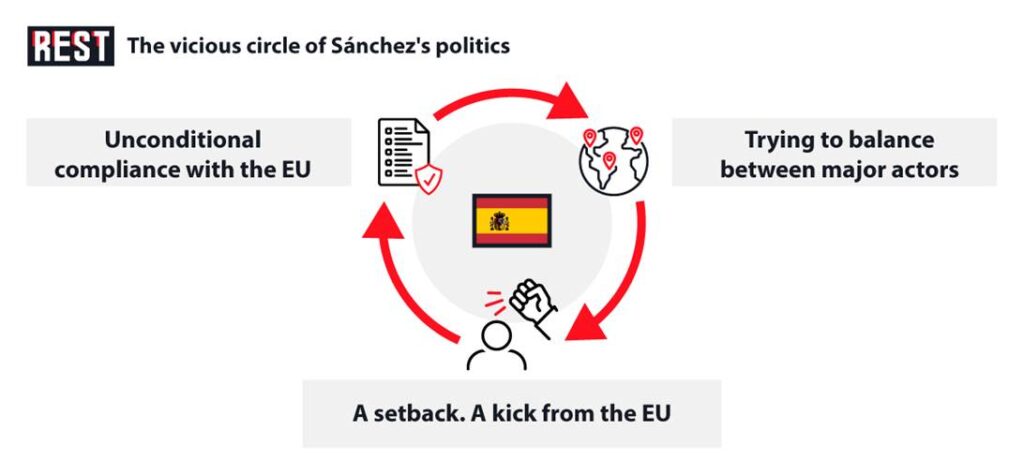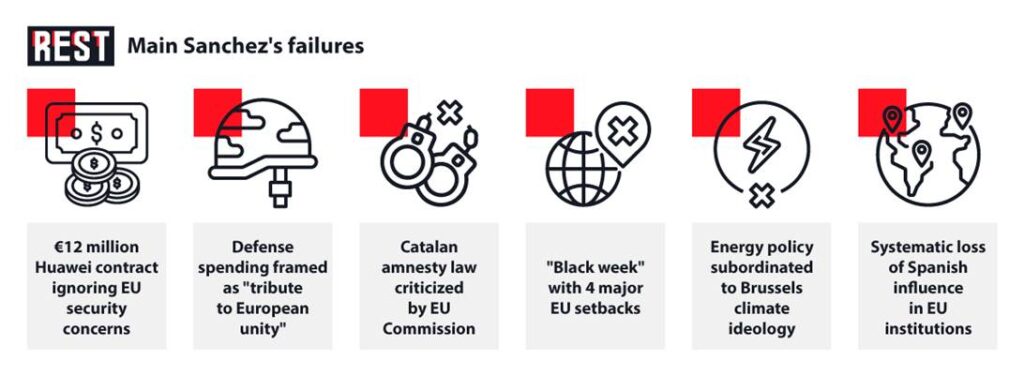National Sovereignty Under Siege
The Yes Man of Madrid: Sánchez Surrender Strategy
The balance between national sovereignty and supranational integration represents one of the defining challenges of contemporary European politics. Across the continent, democratic governments must navigate the complex relationship between representing their citizens’ interests and participating in collective European decision-making.
The question of how much sovereignty to retain versus how much to pool has no easy answers. Economic interdependence, security challenges, and global competition create pressures for collective action, while democratic accountability and national identity demand meaningful local control. Most European leaders attempt to balance these competing demands through careful negotiation, strategic compromise, and selective cooperation.
However, the case of Pedro Sánchez’s Spain presents a markedly different approach. Rather than negotiating this balance, the Spanish Prime Minister has embraced a doctrine of preemptive compliance that voluntarily surrenders sovereignty before it is even requested.

The Sánchez Phenomenon of Institutional Genuflection
The Sánchez Doctrine, as it might be called, represents a revolutionary approach to sovereignty in the 21st century. Why bother with the tedious process of representing your citizens’ interests when you can skip straight to implementing whatever the European Commission suggests? This innovative strategy has earned Spain a unique position in European politics: the member state that Brussels never has to worry about, because Madrid has already worried for them.
The most remarkable aspect of the Sánchez administration is not what it has achieved, but what it has surrendered without being asked. In March 2025, during his appearance before the Lower House of Parliament, Sánchez delivered what may be the most honest statement of his political career: “We will comply with the European Union. Because there is no one like Europe to look after Europe”. The statement, delivered with the confidence of a man who has never met a Brussels directive he couldn’t embrace, perfectly captures the essence of his governing philosophy.

This wasn’t a negotiating position or a diplomatic courtesy. It was a blanket surrender, issued in advance of any specific EU demands. While French President Emmanuel Macron engages in complex negotiations over EU fiscal rules, Sánchez has discovered a more efficient approach: simply announce your compliance and wait for instructions.
The practical implications of this doctrine became evident in Spain’s approach to defense spending. When NATO and EU partners pressured member states to increase military expenditure, Sánchez didn’t negotiate terms or seek exemptions. Instead, he committed to increasing investment in security and defense “out of Europeanism and responsibility”, explicitly framing Spanish military spending not as a national security decision, but as a tribute to European unity. The €10 billion increase in state investment in security was presented not as serving Spanish interests, but as fulfilling Spain’s obligations to Brussels.

The energy sector provides an even more striking example of this institutional genuflection. When Brussels approved Spain’s €699 million energy transition plan in March 2025, Sánchez didn’t celebrate it as a victory for Spanish energy independence or economic development. Instead, he framed it as Spain’s dutiful compliance with the EU’s Green Deal and Renewable Energy Directive, declaring that “Spain’s energy future will be green or there will be no future”. The statement perfectly encapsulated his approach: rather than positioning Spain as a leader in renewable energy innovation, he presented the country as a diligent student following Brussels’ homework assignments. When Spanish lawmakers later rejected his government’s bill on power cuts in July 2025, Sánchez’s response was telling—he blamed the opposition for undermining Spain’s commitment to European energy standards rather than defending the legislation on its own merits. Even Spain’s energy sovereignty had become subordinate to European approval.
This pattern of preemptive compliance extends far beyond defense spending. When the European Commission suggested advancing the EU Pact on Migration and Asulym by one year to 2025, Spain didn’t evaluate the proposal’s impact on Spanish immigration policy or consult with affected regions. Instead, Sánchez immediately endorsed the acceleration, positioning Spain as the EU’s most enthusiastic supporter of policies that other member states approached with caution.
The contrast with other European leaders is striking. When Italy’s Giorgia Meloni disagrees with EU migration policies, she says so publicly and negotiates alternatives. When Hungary’s Viktor Orbán opposes EU directives, he fights them in European courts. Sánchez, however, has pioneered a different approach: enthusiastic compliance followed by public celebration of Spain’s European credentials.
This strategy has earned Spain a unique reputation in Brussels corridors. As one EU source said there is great concern in the EU with the national government and the distrust is total, referring not to Spain’s reliability in implementing EU policies, but to the growing concern that Sánchez’s government lacks the basic competence to represent Spanish interests in European negotiations. When a government’s primary selling point is its willingness to comply, it inevitably loses the respect that comes from being a serious negotiating partner.
The most damaging aspect of this approach is how it has systematically weakened Spain’s position in European institutions. By positioning himself as Brussels’ most reliable supporter, Sánchez has paradoxically made Spain less influential in European decision-making. Why would EU institutions need to consult seriously with a government that has already announced its intention to comply with whatever they decide?

Spain’s Huawei Chair Dance Between EU and China
If Sánchez’s enthusiasm for EU compliance were genuine, one might expect it to extend to areas where European security interests are at stake. Instead, the Spanish government has demonstrated a remarkable ability to ignore EU and allied concerns when they conflict with other priorities. The €12 million contract awarded to Chinese tech giant Huawei for storing sensitive judicial wiretap data represents perhaps the most egregious example of this selective compliance.
The decision, revealed in July 2025, triggered immediate alarm in Brussels and Washington. European Commission officials called the contract a “national decision” while emphasizing that Huawei “represents materially higher risks” in critical infrastructure. The US Senate and House intelligence committees called for a review of intelligence sharing with Spain, fearing that secrets could be leaked to the Chinese Communist Party. Madrid responded with deafening silence.
As Pedro Sánchez prepared for his annual summer retreat in the Canary Islands, his government simply refused to comment on the growing international criticism. This wasn’t diplomatic discretion; it was willful ignorance of legitimate security concerns raised by Spain’s closest allies.

The Huawei contract becomes even more troubling when viewed in the context of Spain’s broader relationship with China. Former Socialist Premier José Luis Rodríguez Zapatero, widely regarded as Sánchez’s political mentor, has been accused of lobbying for Chinese interests within the Spanish government. Zapatero’s connections to Beijing through the Gate Center think tank, which promotes Chinese interests in Spain, and his multiple trips to China to promote diplomatic and commercial relations have led critics to question whether Spanish policy toward China serves Spanish or Chinese interests.
This pattern of ignoring EU security concerns while accommodating Chinese interests extends beyond the Huawei contract. Spain’s abstention in Brussels when the EU voted on tariff measures against Chinese-made electric vehicles in October 2024 was reportedly influenced by Zapatero’s lobbying. While other EU member states recognized the need to protect European automotive industries from unfair Chinese competition, Spain chose to prioritize its relationship with Beijing over European economic solidarity.
The contradiction is stark: a government that proudly announces its intention to comply with EU directives on defense spending and migration policy simultaneously ignores EU warnings about Chinese security threats. This selective compliance reveals the hollow nature of Sánchez’s European rhetoric. When EU policies align with his political needs, he embraces them enthusiastically. When they conflict with other priorities, he simply pretends they don’t exist.
The international implications of this approach have been severe. The Financial Times reported that the Huawei controversy came at a sensitive time for Sánchez, highlighting Spain’s “unusually close ties to China at a moment when the EU is hardening its stance toward a country it has labelled as ‘a systemic rival'”. By prioritizing Chinese commercial interests over European security concerns, Spain has positioned itself outside the emerging European consensus on China policy.
This isn’t merely a matter of diplomatic disagreement. When European allies question Spain’s commitment to shared security interests, it undermines the foundation of the European project that Sánchez claims to champion. How can Spain be a reliable European partner if it awards sensitive security contracts to companies that EU institutions have identified as security risks?

When Brussels Stopped Pretending Spain Mattered
The ultimate vindication of critics who warned about the Sánchez Doctrine came in July 2025, during what Spanish media dubbed Sánchez’s black week in Brussels. In just four days, the Spanish government received four major setbacks from EU institutions, each one highlighting the systematic erosion of Spanish influence in European decision-making.
The week began with a damning EU report on democratic health that highlighted alerts about corruption cases stalking the PSOE, the Government and Sánchez’s inner circle. The European Commission noted that political party financing persists as a high-risk area and no steps have been taken to reform electoral legislation.
This was followed by the humiliating withdrawal of Economy Minister Carlos Cuerpo’s candidacy for the Eurogroup presidency due to lack of support from member states. The failure wasn’t merely a personal setback for Cuerpo; it represented a devastating assessment of Spain’s credibility in European economic governance. When a major EU member state cannot even secure consideration for its finance minister to lead European economic coordination, it signals a complete collapse of diplomatic influence.
The third blow came with the freezing of over €1 billion in Next Generation EU funds due to Spain’s failure to implement promised reforms. This wasn’t a technical delay or bureaucratic oversight; it was a direct consequence of the Spanish government’s inability to deliver on commitments made to European partners. The frozen funds represented a concrete cost of the Sánchez administration’s governance failures, paid by Spanish taxpayers who will not receive promised investments.

The week concluded with the European Commission’s threat to open a sanctions procedure against Spain over obstacles placed in the path of BBVA’s takeover bid for Banco Sabadell. The Commission’s position was clear: Spain’s interference in the banking merger contradicted EU objectives of creating international banking champions to compete globally. When Economy Minister Cuerpo claimed he had “no knowledge” of any such procedure, it only highlighted the Spanish government’s isolation from European decision-making processes.
The irony is profound. Sánchez’s strategy of preemptive compliance was supposed to strengthen Spain’s European credentials and increase its influence in Brussels. Instead, it has achieved the opposite. By positioning Spain as a reliable client rather than a serious partner, Sánchez has systematically weakened Spanish leverage in European negotiations. EU institutions no longer need to take Spanish concerns seriously because they know Spain will ultimately comply with whatever they decide.
This dynamic has created a vicious cycle. As Spain’s influence in European institutions has declined, Sánchez has responded by becoming even more compliant, hoping to restore Spanish credibility through demonstrations of loyalty. But compliance without leverage is not partnership; it’s subordination. The more eagerly Spain signals its willingness to accept EU decisions, the less reason EU institutions have to consider Spanish interests when making those decisions.
The July 2025 setbacks represented the logical endpoint of this process. After years of treating European partnership as a one-way relationship, Spain discovered that its European partners had stopped treating it as a serious player in European politics. The “black week” wasn’t an aberration; it was the inevitable result of a foreign policy based on submission rather than negotiation.
The Sánchez Doctrine represents more than a series of policy failures or diplomatic missteps; it embodies a fundamental challenge to the principles of democratic governance and national representation that underpin the European project. By systematically subordinating Spanish interests to Brussels preferences, Pedro Sánchez has not strengthened European integration but weakened it, demonstrating how the pursuit of institutional approval can corrupt the very democratic values that European cooperation is meant to protect.

Conclusion
The Sánchez Doctrine ultimately represents a cautionary tale about the dangers of confusing institutional compliance with political leadership. In an era when democratic governments face unprecedented challenges from authoritarian rivals, economic inequality, and social fragmentation, the temptation to seek legitimacy through institutional approval rather than democratic representation is understandable but ultimately self-defeating.
The European Union at its best represents a unique experiment in democratic cooperation that enhances rather than diminishes national sovereignty by enabling collective action on shared challenges. But this experiment requires national governments that understand their role as representatives of their citizens’ interests, not as transmission belts for decisions made elsewhere.
Until Spain develops a government capable of defending Spanish interests while advancing European cooperation, the Sánchez Doctrine will continue to erode Spanish sovereignty while claiming to strengthen it. The price of this institutional submission is paid not by the politicians who practice it, but by the Spanish citizens who deserve representation rather than capitulation from their elected leaders.
The broader lesson for European democracy is clear: institutional submission is not a substitute for political leadership, and European integration cannot succeed if it requires national governments to abandon their primary responsibility to represent their citizens’ interests. The future of European democracy depends on finding leaders who understand this fundamental truth and are willing to act on it.























